My blog has moved! http://www.patheos.com/blogs/markdroberts/
|
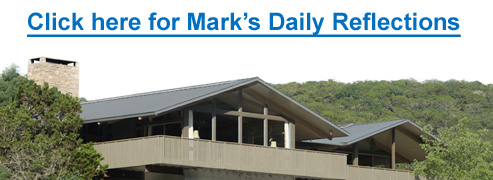 |
Twitter Feed for My Recent Blog Posts and Other Tweets |
My blog has moved! http://www.patheos.com/blogs/markdroberts/
|
Christmas Day: The Word Became Flesh
By Mark D. Roberts | Friday, December 25, 2009
Christmas Day: The Word Became Flesh
So the Word became human and made his home among us. He was full of unfailing love and faithfulness. And we have seen his glory, the glory of the Father’s one and only Son.
The prologue of John’s Gospel tells the story of Christmas, but not in the usual manner. We don’t have angels and shepherds here, or wise men and a star. We don’t even have a babe born in a stable and laid in a manger. Rather, John reveals the theological essence of Christmas. Read the rest of this entry »
Topics: Living Christmasly | 1 Comment »
Advent Calendar for December 25
By Mark D. Roberts | Friday, December 25, 2009
 Click here to see today’s Advent calendar entry
Click here to see today’s Advent calendar entry
Topics: Advent Calendar | No Comments »
Happy Birthday to Jesus!
By Mark D. Roberts | Friday, December 25, 2009
We Celebrate the Birth of Christ
In the season of Advent we have used the Advent wreath and its candles to help us get ready for this great celebration of the birth of Christ.
 When we lit the first purple candle, we asked God to come and be our Good Shepherd. God our Shepherd has come in Jesus Christ!
When we lit the first purple candle, we asked God to come and be our Good Shepherd. God our Shepherd has come in Jesus Christ!
When we lit the second purple candle, we asked God to come and forgive our sins. God has come in Jesus Christ to take our sins and die upon the cross so that we might be forgiven!
When we lit the third, pink candle, we felt joyful even in our longing for Christ to come. Christ, who has been born in a manger, will come again in glory to wipe away every tear from our eyes!
When we lit the fourth candle, we remembered that Christ would come as a son — the son of Mary, the Son of David, and the Son of God! This Son has been born! He is Immanuel — God with us!
Today we celebrate the birth of Jesus the Christ, Jesus the Good Shepherd, Jesus who forgives our sins, Jesus who will come again, Jesus the son of Mary, the Son of David, and the very Son of God!
Prayer for God’s Help
Dear God, as we light the center candle today, may we celebrate with full joy the birth of your Son, Jesus the Christ. Amen!
For the rest of this Christmas devotional, and to light the Christ candle online, please click here.
Topics: Christmas, Advent | No Comments »
Advent Calendar for December 24
By Mark D. Roberts | Thursday, December 24, 2009
 Click here to see today’s Advent calendar entry
Click here to see today’s Advent calendar entry
Topics: Advent Calendar | 1 Comment »
“Hark! The Herald Angels Sing” – The Carol That Shouldn’t Exist, Part 2
By Mark D. Roberts | Thursday, December 24, 2009
Part 3 of series: Christmas Carol Inspiration
Permalink for this post / Permalink for this series
In yesterday’s post I explained that the beloved carol, “Hark! The Herald Angels Sing” was originally penned with a different opening line, “HARK how all the welkin rings.” The author’s original was changed and published by a friend, though without his blessing. If Charles Wesley, who preferred his own “welkin” line, had had his way, we’d never be harkening to angels singing “Glory to the newborn King.”
Oddly enough, the composer of the tune we associate with “Hark! The Herald Angels Sing” did not intend it for such a sacred use. In fact, he specifically noted that this song should not be used for anything having to do with God.
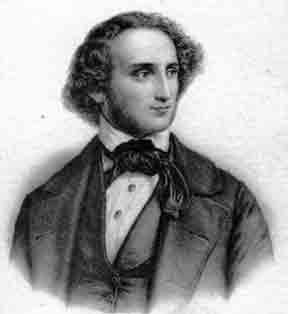 In 1840, Felix Mendelssohn wrote a song for the Gutenberg Festival in Leipzig, Germany. His “Festgesang” celebrated the invention of movable type and printing some 400 years earlier. Mendelssohn recognized the potential popularity of his tune, and advised his publisher concerning its potential use. According to Mendelssohn, in a letter to Mr. E. Buxton, if the right words were written for his song,
In 1840, Felix Mendelssohn wrote a song for the Gutenberg Festival in Leipzig, Germany. His “Festgesang” celebrated the invention of movable type and printing some 400 years earlier. Mendelssohn recognized the potential popularity of his tune, and advised his publisher concerning its potential use. According to Mendelssohn, in a letter to Mr. E. Buxton, if the right words were written for his song,
I am sure that piece will be liked very much by the singers and the hearers, but it will never do to sacred words. There must be a national and merry subject found out, something to which the soldier-like and buxom motion of the motion of the piece has some relation, and the words must express something gay and popular, as the music tries to do. (The Musical Times, Vol 38).
I must admit that before I read this quotation from Mendelssohn, I had never before associated the music of “Hark! The Herald Angels Sing” with the words “national” “merry” “soldier-like” “buxom” “gay” and “popular.” Nevertheless, I understand clearly that the composer, who was born Jewish and converted to Christianity, did not envision a sacred use for his composition, and, in fact, counseled against such usage.
But in 1855, William H. Cummings, the organist at Waltham Abbey in England, who later became a leading English musician, adapted Mendelssohn’s “Festgesang” to the lyrics of “Hark! The Herald Angels Sing.” Previously, this piece had been sung to different tunes. Originally, it was sung to the tune EASTER HYMN, which we use for “Christ the Lord is Risen Today” (or “Jesus Christ is Risen Today”), another of Charles Wesley’s hymns. But when Cummings’ version was published, it quickly became the standard tune for the carol. Soon it was being sung with this tune, not only in England, but also in the United States as well.
So, by the late 18th century, the lyrics that the original writer, Charles Wesley, rejected were being sung to a tune that the composer said should never be used for sacred music. “Hark! The Herald Angels Sing” is, indeed, the carol that shouldn’t exist.
Another Version of the Familiar Carol
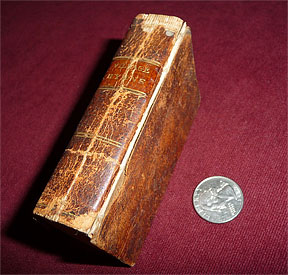 Just for fun, I thought I’d check out my collection of old hymnals to see if I could find a version of “Hark! The Herald Angels Sing.” I did indeed find a version in one of my oldest hymnals, Village Hymns for Social Worship, by Asahel Nettleton (New York, 1836). (Nettleton was an influential reformed theologian and preacher in the 19th century. The name NETTLETON, in honor of Asahel Nettleton, was given to the hymn tune we associated with “Come, Thou Fount of Every Blessing.”) The hymnal appears in the photo to the right. Notice how small it is, approximately 2½ by 3½ inches. And the font is a killer. I wonder how people could ever have used that hymnal!
Just for fun, I thought I’d check out my collection of old hymnals to see if I could find a version of “Hark! The Herald Angels Sing.” I did indeed find a version in one of my oldest hymnals, Village Hymns for Social Worship, by Asahel Nettleton (New York, 1836). (Nettleton was an influential reformed theologian and preacher in the 19th century. The name NETTLETON, in honor of Asahel Nettleton, was given to the hymn tune we associated with “Come, Thou Fount of Every Blessing.”) The hymnal appears in the photo to the right. Notice how small it is, approximately 2½ by 3½ inches. And the font is a killer. I wonder how people could ever have used that hymnal!
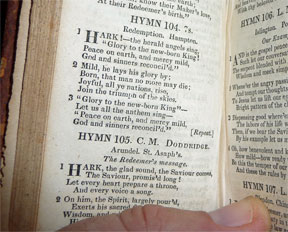 Hymn #104 is clearly a version of carol we sing today, though with different lyrics:
Hymn #104 is clearly a version of carol we sing today, though with different lyrics:
HARK! – the herald angels sing,
“Glory to the new-born King!
Peace on earth, and mercy mild,
God and sinners reconcil’d.”Mild, he lays his glory by;
Born, that man no more may die;
Joyful, all ye nations, rise,
Join the triumph of the skies.“Glory to the new-born King” –
Let us all the anthem sing –
“Peace on earth, and mercy mild,
God and sinners reconcil’d.” [Repeat.]
Nettleton suggests two tunes for this hymn: Redemption and Hampton.
If you’re unfamiliar with the history of church music, you may be surprised to learn just how much variety there was in the early years of some of our most familiar and beloved hymns and carols. Slight changes in hymns in contemporary hymnals can get people pretty upset. Often they’ll say something like, “We should sing the hymns the way they were written!” Little do they know that, often, what they consider to be original is not original at all. Wouldn’t they be surprised if, instead of “Hark! The Herald Angels Sing,” we sang “HARK All the Welkin Rings” to the tune of EASTER HYMN?!
Topics: Christmas Carols | 3 Comments »
Advent Calendar for December 23
By Mark D. Roberts | Wednesday, December 23, 2009
 Click here to see today’s Advent calendar entry
Click here to see today’s Advent calendar entry
Topics: Advent Calendar | No Comments »
“Hark! The Herald Angels Sing” – The Carol That Shouldn’t Exist, Part 1
By Mark D. Roberts | Wednesday, December 23, 2009
Part 2 of series: Christmas Carol Inspiration
Permalink for this post / Permalink for this series
“Hark! The Herald Angels Sing” is surely one of the most popular and beloved of Christmas carols. Each year, it is sung in thousands upon thousands of churches at Christmastime, not to mention being played in countless stores across the world, beginning usually sometime in November. “Hark! The Herald Angels Sing” has been recorded in dozens of versions by many vocalists, including: Frank Sinatra, Bob Dylan, Carrie Underwood, and Mariah Carey. Perhaps the most familiar version of this carol comes in the closing moments of the cartoon classic, A Charlie Brown Christmas, with its opening “Loo-loo-loos” and the orange-slice-shaped mouths of the singing children.
But “Hark! The Herald Angels Sing” should never have come into existence, at least if its writer and composer had anything to say about it.
You wouldn’t discover this if you looked up this carol in a hymnal or songbook. There, the writer is identified as “Charles Wesley, 1739, alt.” 1739 is the date in which the lyrics were written. “Alt” means that the original words have been altered. The music for “Hark! The Herald Angels Sing” is attributed to Felix Mendelssohn, 1840, with arrangement by William Cummings, 1855. From this data you would conclude that the carol was written in 1739 by Wesley. In 1855, William Cummings used a melody of Mendelssohn, arranging it into the familiar tune we know today. All of this would be true, in a way. But this story misses the ironic drama of the origin of “Hark! The Herald Angels Sing.”
The Story Behind the Lyrics
 In 1739, John and Charles Wesley published Hymns and Sacred Poems, which included Charles’ “Hymn for Christmas-Day.” This hymn featured familiar lines such as: “Peace on Earth, and Mercy, mild, GOD and Sinners reconcil’d! Joyful all ye Nations rise, Join the Triumph of the Skies.” But it did not begin with the familiar opening line, “Hark! The herald angels sing, Glory to the newborn King.” In fact, the original Wesley carol began, “HARK how all the Welkin rings, Glory to the King of Kings.” No herald angels to be found here! (Photo: A page from Hymns and Sacred Poems, including “Hymn for Christmas-Day” with its “welkin.” Photo from Hymns and Carols of Christmas.)
In 1739, John and Charles Wesley published Hymns and Sacred Poems, which included Charles’ “Hymn for Christmas-Day.” This hymn featured familiar lines such as: “Peace on Earth, and Mercy, mild, GOD and Sinners reconcil’d! Joyful all ye Nations rise, Join the Triumph of the Skies.” But it did not begin with the familiar opening line, “Hark! The herald angels sing, Glory to the newborn King.” In fact, the original Wesley carol began, “HARK how all the Welkin rings, Glory to the King of Kings.” No herald angels to be found here! (Photo: A page from Hymns and Sacred Poems, including “Hymn for Christmas-Day” with its “welkin.” Photo from Hymns and Carols of Christmas.)
If you’re like me, you haven’t used the word “welkin” recently. It appears eighteen times in Shakespeare’s plays, but hasn’t received a lot of play in the last couple of centuries. “Welkin” is a word for the vault of heaven, the place where stars and angels dwell. Charles Wesley began his hymn for Christmas with the heavens ringing with the glory of the King of kings. The rest of the original carol is similar to the one we sing today, with the exception of the ninth and tenth verses, which were deleted by some eighteenth- or nineteenth-century editor. These verses read:
Adam’s likeness, Lord, efface,
Stamp thy Image in its Place,
Second Adam from above,
Reinstate us in thy Love.Let us Thee, tho’ lost, regain,
Thee, the Life, the Heav’nly Man:
O ! to All Thyself impart,
Form’d in each Believing Heart.
The one who omitted these verses, and, more importantly, the one who changed “welkin” to “angels,” was none other than the eighteenth-century evangelist and good friend of Charles Wesley, George Whitefield. Sensing the obscurity of “welkin,” Whitefield changed the Christmas hymn to read, “Hark the Herald Angels sing, Glory to the new-born King!” Whitefield went on to publish his version of the hymn, which, apparently, distressed his friend Charles Wesley, who resented, among other things, the unbiblical picture of angels singing. In Luke 2, the angels are “saying, “ not singing, “Glory to God in the highest . . . .” Other editors added to Whitefield’s changes, so that the carol we know today differs from Wesley’s original in several respects. (For more information, see Raymond F. Glover, The Hymnal 1982 Companion, #87.)
The Wesley brothers were not altogether happy about the changes made to their hymns, including “Hymn for Christmas-Day.” Here’s what John wrote in the preface to the 1779 edition of A Collection of Hymns for the use of the people called Methodists:
Many gentlemen have done my brother and me (though without naming us) the honour to reprint many of our Hymns. Now they are perfectly welcome so to do, provided they print them just as they are. But I desire they would not attempt to mend them; for they really are not able. None of them is able to mend either the sense or the verse.
Therefore, I must beg of them one of these two favours; either to let them stand just as they are, to take them for better for worse; or to add the true reading in the margin, or at the bottom of the page; that we may no longer be accountable either for the nonsense or for the doggerel of other men.
As it turns out, the doggerel of other men, including George Whitefield, prevailed over the careful poetry of Charles Wesley, and “Hark! The Herald Angels Sing” became a classic Christmas carol, while “HARK how all the welkin rings” disappeared into the dustbin of good intentions.
Yet the ultimate prevalence of “Hark! The Herald Angels Sing” had to do, not only with the revised lyrics, but also with the stirring melody, a melody that was never intended for such a sacred purpose by its composer. I’ll tell this part of the story tomorrow.
Topics: Christmas Carols | 1 Comment »
Advent Calendar for December 22
By Mark D. Roberts | Tuesday, December 22, 2009
 Click here to see today’s Advent calendar entry
Click here to see today’s Advent calendar entry
Topics: Advent Calendar | No Comments »
Christmas Carol Inspiration: An Introduction
By Mark D. Roberts | Tuesday, December 22, 2009
Part 1 of series: Christmas Carol Inspiration
Permalink for this post / Permalink for this series
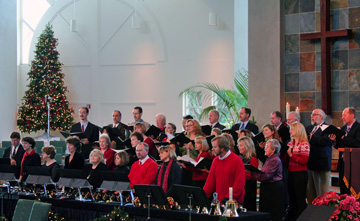 For several years I have wanted do a series on Christmas carols, one that would include some interesting bits of history as well as a theological examination of the lyrics. And for several years I have found myself distracted by other blogging priorities. This year has been no exception. So my carol series remains a figment of my hopeful imagination. In 2004 I did write a short series called Christmas Carol Surprises, which did cover a piece of the ground I hope to survey in a new series. But most of what I have had in mind remains there, in my mind. (Photo: The Chancel Choir and Bell Choir of Irvine Presbyterian Church presenting a Christmas carol.)
For several years I have wanted do a series on Christmas carols, one that would include some interesting bits of history as well as a theological examination of the lyrics. And for several years I have found myself distracted by other blogging priorities. This year has been no exception. So my carol series remains a figment of my hopeful imagination. In 2004 I did write a short series called Christmas Carol Surprises, which did cover a piece of the ground I hope to survey in a new series. But most of what I have had in mind remains there, in my mind. (Photo: The Chancel Choir and Bell Choir of Irvine Presbyterian Church presenting a Christmas carol.)
It dawned on me recently that my hope of doing an extended series on carols during one Christmas/Advent season may be unrealistic. Perhaps, I thought, I should just start by doing one or two carols this year. Then I can add to the series in future years. So that’s the plan. Today I’m going to introduce the series. Then, in the next couple of days, I’ll focus on one carol. At least that will get me out of the starting blocks. Next year, Lord willing, I’ll add to this beginning.
What I Plan to Do
My game plan is simple. I will pick several Christmas carols, beginning with some of the most popular. If appropriate, I will share some relevant tidbits about the song’s composer and/or composition, and perhaps about its music as well. Then I will focus on the lyrics of the carol, especially its theological affirmations.
Why Am I Doing This?
I’m doing this series on Christmas carols for several reasons. First, I love carols. With a few exceptions, I love to hear them and to sing them. I love the warm, nostalgic feeling they stir up within me. And, most of all, I love the message they proclaim with poetic profundity.
I’m not alone in my love for Christmas carols. But I have found that most people have never stopped to consider their meaning, especially beyond the first, common verse. If I were to ask you for the themes of “Silent Night,” for example. You’d probably say something about the quiet of the night when Jesus was born. That would be right, to a point. But you may not remember that the third verse of the standard English version of the carol celebrates the shining of God’s love and grace from the face of the infant Jesus. And you may not realize that the original German had the baby laughing with God’s love.
This series on carols, will, I hope, help you understand more of the poetic theology of several beloved Christmas songs. Yet my point isn’t merely academic. I believe that the more we understand the message of the carols, the more we will be inspired as we hear and sing them. And this inspiration will lead us more deeply into the meaning of Christmas, even as it will encourage our worship of the God who came to dwell with us in the first Christmas.
In the Meanwhile
Tomorrow I’ll begin by examining the background of one of our favorite carols. We’ll have to wait until next year for more. In the meanwhile, however, I would encourage you to begin to think about what you’re singing at Christmastime. You may even want to grab your favorite book of carols and use it as fodder for your Christmas devotions.
If you’re looking for some guidance in your study of Christmas carols, let me encourage you to check out a fabulous website: The Hymns and Carols of Christmas. It contains a huge collection of carols in many versions, as well as discussions of their composition. I will, at times, borrow from this site. As far as I can tell, however, The Hymns and Carols of Christmas contains relatively little theological analysis of the carols. So that leaves me something to do.
As we work through the carols, in this year and in future years, may God grant us the joy of his coming. In the timeless words penned by Isaac Watts, “Joy to the world! The Lord is come. Let earth receive her king!”
Topics: Christmas Carols | 2 Comments »
Advent Calendar for December 21
By Mark D. Roberts | Monday, December 21, 2009
 Click here to see today’s Advent calendar entry
Click here to see today’s Advent calendar entry
Topics: Advent Calendar | No Comments »
Introverts in the Church: A Personal Review, Part 2
By Mark D. Roberts | Monday, December 21, 2009
Part 4 of series: Introverts in the Church: An Interview and Review
Permalink for this post / Permalink for this series
Last Friday I posted the first of a two-part review of Adam McHugh’s new book, Introverts in the Church. As you may recall, I called this a “personal review” because it reflects, first of all, my personal relationship with Adam McHugh, who has been a friend of mine for many years. But this review is also personal in that, today, I will share more of my own response to this book and less of an intellectual critique.
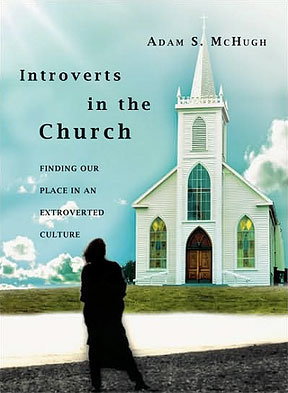 When I last took a personality test, the Myers-Briggs Type Indicator, and that was more than 20 years ago, I came out evenly split between extraversion and introversion. My guess is that I would continue to be more-or-less balanced that way today. But I’m very much more aware these days of my introverted side, perhaps because I feel more freedom to be who I am rather than what my culture wants me to be. I fully agree with Adam’s demonstrated conclusion that both secular and Christian cultures prefer extroverts, and even cast aspersion on introverts. Thus, it’s taken me many years to be able to admit, for example, that although I enjoy being with people (most of the time), social interaction is emotionally and physically draining for me (most of the time).
When I last took a personality test, the Myers-Briggs Type Indicator, and that was more than 20 years ago, I came out evenly split between extraversion and introversion. My guess is that I would continue to be more-or-less balanced that way today. But I’m very much more aware these days of my introverted side, perhaps because I feel more freedom to be who I am rather than what my culture wants me to be. I fully agree with Adam’s demonstrated conclusion that both secular and Christian cultures prefer extroverts, and even cast aspersion on introverts. Thus, it’s taken me many years to be able to admit, for example, that although I enjoy being with people (most of the time), social interaction is emotionally and physically draining for me (most of the time).
Like Adam, I grew up and spent most of my adult life in the context of evangelical Christianity. During my elementary and secondary school years and then during my first seven professional years, I was part of Hollywood Presbyterian Church. One of the hallowed saints from that church’s history was the Rev. Richard Halverson, who spent many years as the chaplain of the U.S. Senate (a position later held by Rev. Dr. Lloyd Ogilvie, who was the Senior Pastor of the Hollywood church during much of my time there). I found it ironic that Introverts in the Church includes, right near the beginning, a quotation from one of Richard Halverson’s books, The Timelessness of Jesus Christ: “The extrovert God of John 3:16 does not beget an introvert people” (Introverts, ch. 1; Timelessness, p. 98). Knowing Dick Halverson, I’m quite sure he did not mean to criticize introverted people with this statement. He used the word “introvert” to describe ourselves when we “make the gospel serve us” or “use it as a protection against the realities of life” or “make us more comfortable,” rather than reaching out to the world with God’s love. But, even though Dick was not intending to censure introverted people, his use of language is quite telling. And it tells against those who are anything other than consistently extroverted.
So, even though I’m not a purebred introvert, but rather more of a mutt, I am nevertheless grateful for Adam’s book. Much of what he commends in the pages of Introverts in the Church I have learned the hard way by personal experience, but it is encouraging, nevertheless, to receive Adam’s affirmation of my lessons and my personality.
Over the years, I have come to grips with the fact that being with people exhausts me. I don’t see this as a bad thing, an aspect of my sinful choices or a part of my fallen nature. Rather, I believe that the introverted part of my nature is just part of me, rather like my receding hairline or righthandedness. Now, if I used the fact that I have introverted tendencies as an excuse for unfriendliness or selfishness, if I turned inward rather than caring for others because I believed myself to be an introvert, then this would move me over into the sinful category of behavior and attitudes. Adam makes very clear in his book that introverts are called to love their neighbors just as much as extroverts, and he has lots of counsel for introverts who might find this intimidating.
Years ago, I wondered if there was something wrong with me because I wasn’t as outgoing as many of my evangelical Christian compadres. Yet if I tried to push myself to be exclusively extroverted, the result backfired. I’d quickly lose the energy needed to be friendly, and would end up isolated in a way that was neither healthy nor loving. But when I realized that being with people took energy rather than giving it to me, and when I allowed that this was simply part of my personality, then I was able to make sure I got the alone time I needed to be refreshed, ready to reach out to people with the love of Christ.
For example, in my role as Senior Director of Laity Lodge, I am often a facilitator of retreats. Thus, I spend most of my time being with people: welcoming them, guiding them, talking with them, listening to them, eating with them, etc. I enjoy this work. But, knowing how so much people interaction uses up my internal energy, I make sure that I get some time alone each day I’m at Laity Lodge. That usually comes during free time in the afternoon. While others are working on art projects or hanging out at the dock–avocations that require a fair amount of human interaction–I am usually taking a hike by myself or with one other person. When I’m alone, I get time to think, to pray, and to recharge my batteries.
I did not need Introverts in the Church to teach me that I need alone time if I’m going to be available to people. Like I said, I learned this the hard way. But I know that there are millions of Christians out there, including thousands of pastors and other church leaders, who are introverts by nature and who are desperately trying to be something else. By denying some of the basics of their personality, these good folk are not doing that which they need to be healthy, happy, active ministers of Jesus Christ. Even Jesus, after all, needed time away from the crowds in order to be refreshed for his ministry. I wonder why we so often forget this.
I am thankful for Introverts in the Church, not only because of its impact on my life, but also because I know it will be a great encouragement to others. Many introverts do feel as if they don’t really belong in the body of Christ. This book will help them find their place. And, I hope it will also help churches to make emotional and spiritual room for introverts. This isn’t just about introverts feeling as if they belong, however. It’s also about the church becoming all that God intends it to be, a place where all of God’s people find a home and partners to serve the Lord in the church and in the world.
Topics: Introverts in the Church | 4 Comments »
Advent Calendar for December 20
By Mark D. Roberts | Sunday, December 20, 2009
 Click here to see today’s Advent calendar entry
Click here to see today’s Advent calendar entry
Topics: Advent Calendar | No Comments »
Advent Devotion: The Lighting of the Fourth Candle
By Mark D. Roberts | Sunday, December 20, 2009
We Remember the Meaning of Advent
Advent is a word that means “coming” or “visit”. In the Christian season of Advent we prepare for the “advent” of Christ at Christmas. Our preparation includes many things:
• We remember Israel’s hope for the coming of God’s Messiah to save, to forgive, and to restore them.
• We remember our hope for the second coming of Jesus.
• We remember our need for a Savior to save us from our sins.
• We prepare to welcome Christ at Christmas into our world . . . and into our hearts.
By lighting one candle each week of Advent, we help ourselves to get ready for the birth of Jesus. So far we have lit three candles. The first reminded us to wait for God our Shepherd. With the second we asked the Lord to come and forgive our sins. The third, pink, candle signified our joy as we wait.
Today we focus on the coming of the Son — the son of Mary, the Son of God!
Prayer for God’s Help
Dear God, thank you for this season of Advent that helps us to prepare for the coming of Christ at Christmas. As we read the Bible and light a candle, may excitement for Christ’s coming burn in our hearts. Amen.
Topics: Advent | No Comments »
Advent Calendar for December 19
By Mark D. Roberts | Saturday, December 19, 2009
 Click here to see today’s Advent calendar entry
Click here to see today’s Advent calendar entry
Topics: Advent Calendar | No Comments »
Advent Calendar for December 18
By Mark D. Roberts | Friday, December 18, 2009
 Click here to see today’s Advent calendar entry
Click here to see today’s Advent calendar entry
Topics: Advent Calendar | 1 Comment »
















